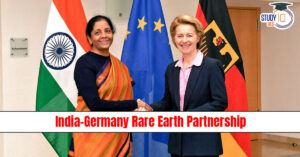Q9. Case study
Subash is Secretary, PWD in the State Government. He is a senior officer, known for his competence, integrity and dedication to work. He enjoys the trust and confidence of Minister Incharge of PWD and Programme Implementation. As a part of his job profile, he is responsible for policy formulation, execution of projects relating to infrastructure initiatives in the State. Besides, he oversees the technical and administrative aspects. relating to planning, designing and construction etc.
Subash’s Minister is an important Minister in the state and significant growth in urban infrastructure development and road network has been registered during his tenure. He is very keen for launching of ambitious road construction project in the near future.
Subash is in regular touch with the Minister and is working various modalities of road construction project. Regular meetings, interactions and presentations are made by him to the Minister before a formal public announcement of the project is made by the Minister. Subash’s only son Vikas is in real estate business. His son from his own sources is aware that a mega road project is on the anvil and announcement in this regard is expected anytime. He is very keen to know from his father the exact location of the upcoming project. He knows that there would be quantum jump in the prices of land in the vicinity. Buying land at this stage at cheaper prices would pay him rich dividends. He is pleading with him (his father) day in and day out to share his location of the proposed project. Hе assured him that he would handle the matter discretely as it would not attract any adverse notice as he, in the normal course, keeps on buying land as a part of his business. He feels pressurised because of constant pleadings by his son.
Another significant aspect of the matter pertained to the extra/undue interest in the above project by the Minister PWD. His nephew was also having a big infrastructure project company. In fact, the Minister has also introduced his nephew to him and indicated to him to take care of his nephew’s business interest in the forthcoming project. The Minister encouraged him to act fast in the matter as early announcement and execution of mega road project would enhance his status in the party and public life.
In the above backdrop, Subash is in a fix as to the future course of action.
(a) Discuss the ethical issuds involved in the case.
(b) Critically examine the options available to Subash in the above situation,
(c) Which of the above would be most appropriate and why?
Answer
| Approach: Identify key ethical issues such as conflict of interest, nepotism, and misuse of office. Examine Subash’s possible options with merits and demerits. Conclude by recommending the most ethical course of action that upholds integrity, transparency, and public trust. |
(a) Ethical issues involved
- Conflict of interest – Subash’s son is in real estate and pressurises him for insider information; his Minister also pushes him to favour his nephew.
- Integrity and impartiality – As a senior officer, Subash must ensure fair policy formulation without favouritism.
- Misuse of official position – Sharing confidential project details with his son or Minister’s nephew would amount to abuse of office.
- Transparency and fairness – Discretionary leaks of project location undermine fairness in land acquisition and benefit select individuals.
- Public trust – Misconduct could erode citizen faith in administration and harm Subash’s credibility.
- Family vs Professional duty – Subash faces pressure to prioritise his son’s business over ethical governance.
- Ministerial influence – The Minister’s undue pressure for nepotistic gains challenges bureaucratic neutrality.
(b) Options available to Subash
- Yield to pressure – Share project details with his son and favour Minister’s nephew.
- Merit: Pleases family and Minister, secures short-term peace.
- Demerit: Illegal, unethical, leads to corruption, public distrust, possible penal consequences.
- Maintain silence and delay decisions – Neither reject nor comply, try to “manage” both sides.
- Merit: Buys time, avoids direct confrontation.
- Demerit: Appeasement is risky; may still harm reputation, encourage more pressure.
- Reject all undue demands firmly – Politely but clearly deny his son’s request and resist nepotistic pressure from the Minister.
- Merit: Upholds integrity, transparency, ensures fair process. Protects long-term reputation and public interest.
- Demerit: Strained relations with family; possible political backlash from the Minister.
- Escalate/Report ministerial pressure – Use institutional mechanisms (CS, Vigilance, or written communication) to safeguard neutrality.
- Merit: Documents his stance, protects himself legally, strengthens rule-based administration.
- Demerit: May antagonise the Minister, risk of transfers or career setbacks.
(c) Most appropriate course of action
- The best option is Option 3 with partial Option 4 – firmly refusing to share insider information with his son and resisting undue pressure from the Minister.
- Subash should uphold transparency and impartiality in policy formulation, ensuring decisions are fair and in public interest.
- He must document and, if needed, escalate the Minister’s undue interference through proper institutional channels (Chief Secretary, Vigilance) to safeguard himself legally.
- By prioritising integrity over personal or political pressures, Subash will protect public trust and prevent misuse of office.
- Following the Socratic principle of acting justly without fearing consequences, he will set a benchmark of ethical conduct in governance.
- This course of action ensures a balance between family responsibility and professional duty, keeping public interest above private gain.
- Ultimately, it strengthens Subash’s credibility, accountability, and long-term reputation as an honest public servant.
Subash must prioritise integrity over personal or political pressures, resisting both family and ministerial influence. By upholding transparency and public interest, he safeguards governance credibility, sets ethical precedent for civil servants, and ensures long-term trust in democratic institutions.

 Particle Therapy Breakthrough: Future of...
Particle Therapy Breakthrough: Future of...
 India’s Space Missions 2026: Chandraya...
India’s Space Missions 2026: Chandraya...
 India–Germany Rare Earth Partnership: ...
India–Germany Rare Earth Partnership: ...

























